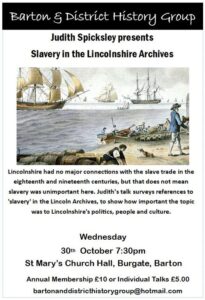
- This event has passed.
Slavery in Lincolnshire – Barton and District History Group
Organized by: Barton & District History Group
Event Navigation
The next presentation on October 30th will be at St Mary’s Church Hall on Burgate at 7:30 PM when
Dr. Judith Spicksley will give a presentation “Slavery in the Lincolnshire Archives”.
 It has been proposed that slavery may have arisen from circumstances where an individual, facing imminent death and with no other options, would offer their entire lifetime of service in exchange for survival. In this view, slavery could have emerged in response to threats such as famine, judicial punishment, or conflict.
It has been proposed that slavery may have arisen from circumstances where an individual, facing imminent death and with no other options, would offer their entire lifetime of service in exchange for survival. In this view, slavery could have emerged in response to threats such as famine, judicial punishment, or conflict.
The development of the actual “slave trade” likely came later, as communities in need of additional labour began to sell or exchange individuals under their control for an agreed price. This marked the transition from personal servitude to a formalized market in human lives.
The earliest known method of debt recovery was through distraint on the body of the debtor. Enslavement, then, can be seen as a particularly exploitative form of this practice, justified by the obligations imposed on the debtor. This legal and social mechanism played a critical role in establishing slavery as an institution.
Lincolnshire had no major connections with the slave trade in the eighteenth and nineteenth centuries, but that does not mean slavery was unimportant here. Judith’s talk surveys references to ‘slavery’ in the Lincoln Archives, to show how important the topic was to Lincolnshire’s politics, people and culture.
Admission – Members free; non-members £5

